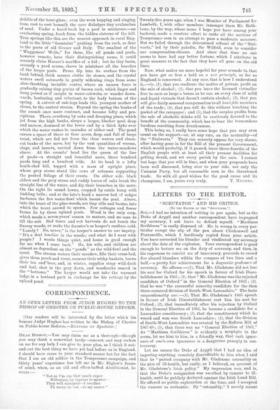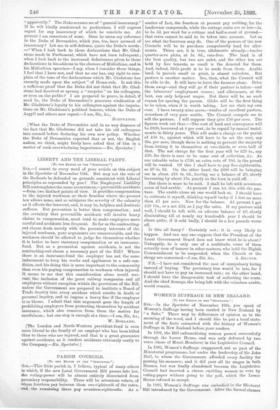LETTERS TO THE EDITOR.
" SCRUTATOR " AND HIS CRITICS.
[To THE EDITOR OF THE " SPECTATOR.1 Sin,—I had no intention of writing to you again, but as the Duke of Argyll and another correspondent have impugned my accuracy, I ask leave to defend myself. "Martinus Scriblerus " is easily disposed of. He is wrong in every par- ticular except the slip of the pen about Clerkenwell and Pentonville, which I heedlessly copied from your article. You have corrected his blunder and vindicated my accuracy about the date of the explosion. Your correspondent is good enough to lecture me on the duty of accuracy, and then, in his eagerness to convict me of inaccuracy, proceeds to crowd five absurd blunders within the compass of two lines and a half, —a pretty fair achievement for a dogmatic professor of accuracy. He affirms :—(1), That Mr. Gladstone did not lose his seat for Oxford for his speech in favour of Irish Dises- tablishment in 1865 ; (2), that " Mr. Gladstone was the rejected candidate of Oxford" in the General Election of 1861; (3), that he was " the successful minority candidate for the then three-cornered division of South-West Lancashire." The facts unquestionably are :—(1), That Mr. Gladstone's 1865 speech in favour of Irish Disestablishment cost him his seat for Oxford ; (2), that immediately after his rejection by Oxford in the General Election of 1865, he became a candidate for a Lancashire constituency ; (3), that the constituency which he wooed and won was South Lancashire ; (4), that the division of South-West Lancashire was created by the Reform Bill of 1867-68 ; (5), that there was no " General Election of 1861." As " Martinns Scriblerus " is evidently a neophyte in the arena, let me hint to him, in a friendly way, that rash ignor- ance of one's own ignorance is a dangerous panoply in con- troversy.
Let me assure the Duke of Argyll that I had no idea of imputing anything remotely discreditable to him when I said that he " parted company with Mr. Gladstone ostensibly on the plea of ill-health, but really, as I believed, on account of Mr. Gladstone's Irish policy." My impression was, and is, that the Duke's resignation was ascribed by rumour to ill- health, until he publicly declared against the Irish Land Bill. He offered no public explanation at the time, and I accepted the rumour as authentic. By "ostensibly," I merely meant " apparently." The Duke accuses me of " general inaccuracy." If he will kindly condescend to particulars, I will express regret for any inaccuracy of which he convicts me. At present I am conscious of none. Does he mean my reference to the Duke of Devonshire, which you, too, have accused of inaccuracy P Let me, in self-defence, quote the Duke's words : —" When I look back to those declarations that Mr. Glad- stone made in Parliament, which have not been infrequent ; when I look back to the increased definiteness given to those declarations in his address to the electors of Midlothian, and in his Midlothian speeches—I say, when I consider these things, I feel that I have not, and that no one has, any right to com- plain of the tone of the declarations which Mr. Gladstone has recently made upon the subject" of Home-rule. Is not this a sufficient proof that the Duke did not think that Mr. Glad- stone had deceived or sprung a " surprise" on his colleagues, or even on the public P I am prepared to prove, in detail, if need be, the Duke of Devonshire's generous vindication of Mr. Gladstone's loyalty to his colleagues against the imputa- tions on Mr. Gladstone's political honour, which the Duke of Argyll and others now repeat.—I am, Sir, Ac.,
SCRUTATOR.
[What the Duke of Devonshire said in no way disposes of the fact that Mr. Gladstone did not take his old colleagues into council before declaring his own new policy. Whether the Duke of Devonshire expected that or not, the English nation, we think, might fairly have asked that of him in a matter of such overwhelming importance.—ED. Spectator.]







































 Previous page
Previous page